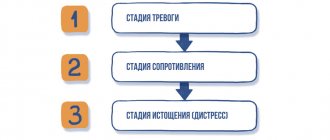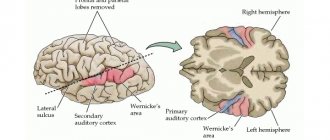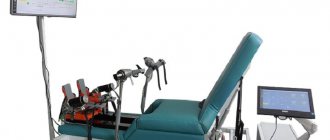Any act or action of a person is preceded by mental activity, during which the choice of one single solution from many options occurs.
The prefrontal cortex (PC) is responsible for this process in the brain, which, based on accumulated life experience, determines the reaction to a particular situation.
It is this area that is the basis for building personality, therefore its development and preservation in a normal state is important for every person.
General information
The prefrontal cortex is one of the parts of the frontal lobes of the brain, with the help of which any action performed by a person is controlled, controlled and focused.
In addition, this area allows the individual to effectively distribute his time, and also influences the social behavioral line in society. PC includes 6 (9, 10, 11, 12, 46, 47) Broadmon fields. It is located directly behind the frontal bone and is the anterior third of the cerebral cortex.
Psychiatrist Thomas Galtieri characterized this zone as a tool that allows a person to set a goal, develop a plan for its implementation and achieve it even in the presence of obstacles, by making timely changes to the developed line of behavior. He believed that the presence of a well-developed and normally functioning PC is the main factor in the effectiveness of an individual.
PC structure
The structure is based on three areas of the frontal lobe - dorsolateral, medial and orbitofrontal.
The dorsolateral region controls the expression of emotions in a specific situation through its connection with the limbic system. In addition, this area of the cerebral cortex influences a person’s attention.
The medial region is responsible for recording information into short-term memory and allows you to compare data received by the senses and stored in the brain. Also, this part of the cortex allows you to transfer information from short-term memory to its permanent storage location.
The orbitofrontal region helps to use accumulated experience when making decisions.
Functions
The PC is one of the most developed areas of the brain, which performs a large number of functions. The main ones are:
- Concentration of attention, allowing a person to focus on isolating only the necessary information, ignoring extraneous sensations and thoughts. This is due to the ability to send impulses to the sensory and limbic areas of the brain, which reduce distracting signals. Concentration is very important when studying and having to work for a long time on the same project.
- Perseverance in achieving set goals and objectives, which allows you to continue to strive for the intended result, despite difficulties and force majeure circumstances.
- Assessment of the current situation. In this case, all factors influencing the ongoing event are taken into account, and not just a limited set. This PC function allows a person to comprehensively consider problems, which greatly facilitates the search for solutions.
- Critical thinking, which allows you to develop the necessary set of actions to find reliable and verified information. In other words, a person must ensure that the data is correct before using it.
- Planning allows you to develop specific measures and actions to achieve the intended goal. This PC function significantly reduces the number of uncertain factors and force majeure circumstances when performing the assigned task.
- Forecasting events, which allows planning to take into account even those factors and circumstances that may arise in the future.
- Using accumulated experience. Thanks to this function, a person will take into account mistakes made in the past and if similar situations arise, he will choose the option that will prevent a repetition of the unfavorable outcome.
When considering functions, special attention must be paid to its management of human emotions. In the PC, the perception and translation of processes occurring in the simpler limbic system into certain feelings and emotions (love, hatred, joy, grief, desire, etc.) occurs.
The prefrontal cortex is also responsible for empathy, which allows you to determine the feelings and mood of another person by the emotions they express.
In addition, the PC constantly monitors the limbic system for strong emotional outbursts and extinguishes them when they occupy a dominant role. This helps a person to react to events happening around him not impulsively, but only after careful analysis and selection of the best solution, which will take into account possible future consequences.
New look for old things
- Oh @#%*@#!, look at the calendar! Your tax return is due in a month, and you haven’t even started filling it out yet!
“But that can wait until tomorrow, can’t it?”
* By the way, I want to make one confession. My favorite excuse: “I don’t have time for this.” When someone says they "can't get enough" of something, what they really mean is that they are not that interested in the task or, alternatively, that it is relatively more emotionally unpleasant than other tasks. We all have 24 hours a day, and we choose how to fill them. But I digress.
Whenever you notice that your brain is having an internal debate about whether or not you should start doing something now, or find yourself saying to yourself, “I’ll do that later,” “I’m not in the mood to do that right now,” or Worst of all, “I’ll do it when I have more time” is a signal that the task at hand is emotionally unpleasant and something needs to be done to significantly increase its attractiveness to you*.
Because filing taxes is such a hassle, an entire industry has arisen that employs 320,000 people in the US alone. And this is not surprising: if filing tax returns was as easy as pressing a button on a computer, this industry simply would not exist. According to Intuit, the maker of TurboTax software, their product, among other things, helps make filing taxes less boring and frustrating, since “nearly a third of taxpayers wait until the last minute to file their taxes.”[…]
By understanding the triggers for procrastination and making a plan accordingly, you can make any task more attractive. For example, if I find myself procrastinating on filing my taxes, I sit down and decide that I will remove the impact of negative triggers in the following ways:
• If the task is boring: I’ll go to my favorite cafe on Saturday and fill out a tax return over a cup of some exotic coffee, and at the same time watch life around me.
• The task is extremely routine, creating a feeling of fruitless efforts: I come to the same cafe, but in addition to the data for working on the declaration, I have a book with me. I set a timer on my smartphone and work on my taxes for exactly 30 minutes. I only work for more than 30 minutes if things have started and I feel able to continue.
• Challenging: Will do research to figure out exactly what steps I need to take and what documents to collect. I'll go to a cafe during my biological prime time, when I have more energy.
• The task is unstructured or ambiguous: I will conduct research on the relevant topic and, on this basis, draw up a detailed plan of all the necessary steps.
• The task has no personal meaning: I am looking for positive aspects. For example, if there is a tax refund available, I try to think about how much it might be and make a list of what I would spend the money on.
• When completing a task, it is impossible to feel satisfaction from the process itself, there are no intermediate incentives: for every 15 minutes I spend working on taxes, I allow myself to spend two and a half dollars on some whim or reward myself with some other in a meaningful way for completing a certain stage.
I agree, filing your taxes will likely never be as fun as watching a movie on Netflix.
But we were close to the goal, weren't we?
Symptoms of dysfunction
Disruption in this area is accompanied by the following symptoms:
- Absent-mindedness, in which a person cannot concentrate on obtaining the necessary information. This happens due to the fact that incoming data is not stored in short-term memory due to it being overwritten by newly arrived data.
- Incorrect or incomplete assessment of the situation. In this case, the information is either distorted or received incompletely, since multiple signals arrive from the sensory area at the same time, which overlap each other, as a result of which the PC either perceives the strongest data, or they are all missed.
- Impulsivity, in which a person does actions without first thinking and analyzing their consequences.
- Lack of critical thinking. This symptom is manifested by the fact that a person takes any information on faith and does not double-check it.
- Performing any action without planning. In this case, a person goes towards his intended goal with a large number of unexpected difficulties that could have been avoided.
- Making the same mistakes when a decision is made without reference to accumulated experience, but only on desires.
- A complete or partial lack of emotionality, due to the fact that the prefrontal cortex is unable to process and display received signals from the limbic system.
- Hyperactivity, which manifests itself in the inability to concentrate on a specific task and violent expression of emotions.
If at least one of the above symptoms occurs, a person needs to see a doctor for a brain examination. The functioning of the cortex is tested using the SPECT technique, which is based on comparing the activity of a given area of the brain in a state of rest and stimulation. In case of pathologies in the stimulated mode, activity will either remain in place or decline.
Some of the main reasons for the appearance of pathologies in the brain are hemorrhage in the brain due to a head injury or extensive stroke and intoxication of the body with harmful substances (alcohol, poisons, toxins, etc.). There are also frequent cases of PC deviation due to genetic and viral diseases that affect the central nervous system (CNS). In addition, the performance of PC functions can be affected by prolonged stress and lack of sleep.
We should not forget the fact that the cortex ceases to perform its functions partially or completely as a person ages. This is caused by a severe reduction in neurons in this area of the brain.
How can you train your prefrontal cortex?
Training the prefrontal cortex involves reading, counting and writing. There is a technique, the points of which must be followed every day. On average, executing the entire algorithm does not take more than 5 minutes a day:
- Remembering yesterday's events. To do this, within a few minutes you need to remember yesterday’s activities: who the conversation was with, how the interlocutor was dressed, what the weather was like, what they read and what words were spoken. In general, the task is to remember as much as possible from yesterday.
- Reading aloud. You can read any small, simple article that catches your eye. The bottom line: after reading the column, you need to write down the time spent reading, after which you need to comprehend the information and retell it out loud to yourself. After just a month of daily training, memory properties improve by up to 20%.
- Writing words. You need to write not on the keyboard, but with a pen. On paper, you can write down your thoughts, an article you read, or outline your plans for the next week.
The prefrontal cortex naturally atrophies as people age. This fact is associated with senile dementia or dementia, which can develop into Alzheimer's disease. Medical fact: people whose lifestyle is associated with intellectual pursuits are less susceptible to involutional changes in the cerebral cortex.
As atrophy progresses, memory deteriorates. It is more difficult for a person to remember events from life, the speed of thinking decreases, and the consolidation of associations slows down.
This cortex also performs the function of forgetting. This is a natural process of freeing the hippocampus from “garbage” - one of the protective mechanisms of the human psyche.
Preventing problems
There are a number of measures that can not only prevent disorders of the prefrontal cortex, but also enhance its performance. For this purpose, specialized medications are used that activate the work of the central nervous system and brain (glycine, undevit, aminalon, bilobil, Brain Rush, etc.).
In addition, the good condition of the body as a whole has a positive effect on the functioning of this zone. To maintain it, it is necessary to: limit or completely abstain from drinking alcoholic beverages, follow a fruit and vegetable diet, and also engage in physical exercise daily. It is also recommended to use meditative practices that help relax the central nervous system and help activate the prefrontal cortex.
If the cause of problems is stress, age or sleep, then a visit to psychologists may be prescribed to undergo specialized training that is aimed at developing the functions performed by the prefrontal cortex.
An example would be exercises that help you plan your day wisely, set and step-by-step fulfill life goals, and control your behavior in stressful situations.
Causes of nervous breakdowns
When we got home after the pancake episode, I was still angry with my son. I went into one of the rooms, leaving my son in the other, took a deep breath, stretched and tried to calm down before doing anything.
I knew that physical activity in the fresh air would be good for me, so my daughter and I went rollerblading. This has been one of our favorite things to do since she was six years old. We rode in silence for a while, holding hands. I felt the rhythm of our movements and the resistance of the air. Gradually, I literally began to come to my senses.
After some time, my daughter asked me why I yelled at my brother over some pancake.
Good question. I replied that it is important to be able to share with others. A dubious excuse, yes, but I couldn't think of anything else.
At that moment, a whole stream of associations arose in me, similar to the pages of a children's photo album flashing before my eyes. I realized that I saw myself as a child in my daughter, and my older brother in my son. I remembered my brother playing with me when we were little and even protecting me from other kids in elementary school. But then he grew into a teenager and we didn't get along so well and rarely spent time together. Despite the fact that now we communicate closely and remember that time with laughter, then I perceived it very painfully. I told my daughter that I once decided that if I had children, I would try to do everything to make them friends.
To this, my daughter, with exceptional insight, stated that this was my problem and had nothing to do with her and her brother. She even added that I should solve it without involving the children.
My daughter, of course, was right. We drove around some more, my mind gradually calmed down, my prefrontal cortex kicked in, and I began to think about what had happened. Now I could look inside myself, analyze my emotions and see what led to my breakdown.
But what brought back my ability to mindsight while my daughter and I were rollerblading?











